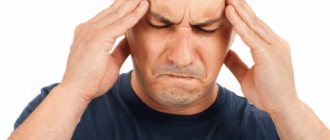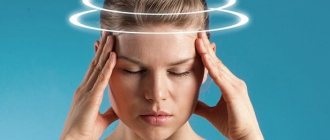How to relieve symptoms
Dizziness that appears periodically and the presence of noise in the hearing organs sometimes becomes a response to damage to the peripheral part of the vestibular system.
As a rule, unpleasant sensations in the head that arise as a result of some psycho-emotional illness pass away. In case of repeated manifestation of the condition, it is necessary to consult a neurologist or sometimes a psychotherapist. If there is a lot of chronic sleep deprivation that is causing uncomfortable symptoms, relying only on medications is dangerous. It's best to try to get back to normal. Never-ending tasks and work are not an argument that explains lack of sleep. It is necessary to realize that regular symptoms may gradually appear more often and the situation that has arisen will be much more difficult to correct.
Also, loss of orientation can occur with long-term use of a number of drugs or after their withdrawal.
What to do in case of pressure in the head, vomiting and ringing in the hearing organs? In such a position, it is not difficult to lose your balance or remain unconscious, so it is better to take into account some tips:
- in case of loss of coordination, it is necessary to find something to lean on, for example, it could be tables, chairs, trees;
- do not squat or close your eyes;
- concentrate, try to make sure your breathing is correct. Do not sigh with convulsions, try to breathe through your nose;
- increase the air supply. Loosen your belt, tie, open the windows;
- you should rest a little, interrupt classes for 10 minutes;
- take a sip of water, you're probably feeling dizzy from dehydration.
From time to time, the head may become numb or swell in stuffy rooms. For example, during lectures in classrooms, you can find yourself in an unconscious state without any special signs. To prevent this from happening, you need to be able to “switch” to something pleasant. Sometimes people experience a feeling of stuffiness in their ears in transport, and sometimes vomiting due to motion sickness. In such cases, it is necessary to get off or move closer to the driver, concentrating on the road.
Dizziness: symptoms
In addition to dizziness and congestion, you may experience:
- General weakness - this symptom accompanies many diseases of the hearing organ. It can also occur with atherosclerosis, pressure changes or stroke.
- Nausea - this symptom may be the result of compression of the arteries of the spine, which often accompanies cervical osteochondrosis.
- Impaired motor activity - may indicate arterial hypertension, stroke, or compression of the arteries.
- The appearance of fog before the eyes is associated with a lack of nutrition in the vessels of the organ of vision or with a sudden outflow of blood from the brain.
- Headaches are usually caused by insufficient nutrition of the brain.
Dizziness can be combined simultaneously with symptoms that appear in diseases of the inner ear, vegetative-vascular problems, and surges in blood pressure. It often indicates an inflammatory process leading to significant health changes.
If ear congestion indicates disturbances in the system that is responsible for the balance of the human body, nausea, vomiting with attacks of vertigo (dizziness) occur.
There are many factors that precede dizziness and blocked ears. The most common are overwork, overwork at work, lack of sleep, poor diet, and constant stress.
Stuffed ears and dizziness can occur due to a cold or flu, and can also be a sign of otitis media. Then visit an ENT doctor who will make a diagnosis and select the necessary course of treatment.
Other causes of ear congestion and dizziness:
- Increase, decrease in blood pressure. Measure your blood pressure. If you find frequent fluctuations, consult a doctor and undergo a course of treatment. Dizziness and stuffy ears can occur from increased cranial pressure.
- Migraine, a neurological disease with the same symptoms, often cannot be treated, but if it is detected in time, it is possible to significantly alleviate the symptoms.
- Cervical osteochondrosis. The diagnosis provokes dizziness and blocked ears. This requires proper treatment from a specialist.
- Reduced hemoglobin. Get tested to check your hemoglobin levels so your doctor can prescribe foods and medications you should take.
- Mental disorders. Contact a psychotherapist, most likely he will prescribe antidepressants and tranquilizers.
- Cancerous tumors. It is imperative to undergo diagnostic testing to detect oncology if the diagnosis is suspected.
- Diseases of the nervous, cardiac, and vascular systems.
- Skull injuries.
- Sharp narrowing of blood vessels.
- Disorder of the inner ear.
- Pregnancy.
- Taking medications that cause side effects.
- Vegetative-vascular dystonia, people complain of discomfort in the ears and neck, fainting states, darkening of the eyes, are afraid of losing their minds, experience painful sensations in the muscles, a lump in the throat, ringing in the ears, flashing colored dots, loss of vision.
- Intoxication reaction of the body.
When you feel dizzy, feel very weak, and have stuffy ears for no apparent reason, you need to calm down, sit on a chair or bench and wait out the attack. Do not squat suddenly or close your eyes, as dizziness may worsen into loss of consciousness. Need to:
- loosen tight clothing;
- provide access to fresh air;
- even out your breathing.
Keep your head straight and try not to bend over. If necessary, drink a glass of water, and when you feel better, seek medical help. But if the condition worsens, you need to urgently call an ambulance. If the attack started on public transport, find somewhere to sit and try to calm down.
If you are stressed or have high blood pressure and have ear congestion, take 20 drops of Barboval or Corvalol in a glass of water and rest a little. If, remembering something, you feel unpleasant symptoms, you should seek advice from a neurologist, psychologist or psychiatrist. If you are chronically sleep deprived, it is recommended to restore your sleep pattern and get a good rest.
If you are overworked and have hypoglycemia not associated with diabetes, you need to rest and drink tea with lemon and sugar. If attacks of hypoglycemia become more frequent, you should consult an endocrinologist. Dehydration often causes such symptoms, therefore, at the first signs, you should equalize the water-salt balance with plenty of mineral water.
Dizziness that appears periodically and the presence of noise in the hearing organs sometimes becomes a response to damage to the peripheral part of the vestibular system. As a rule, unpleasant sensations in the head that arise as a result of some psycho-emotional illness pass away.
If there is a lot of chronic sleep deprivation that is causing uncomfortable symptoms, relying only on medications is dangerous. It's best to try to get back to normal. Never-ending tasks and work are not an argument that explains lack of sleep.
Also, loss of orientation can occur with long-term use of a number of drugs or after their withdrawal.
What to do in case of pressure in the head, vomiting and ringing in the hearing organs? In such a position, it is not difficult to lose your balance or remain unconscious, so it is better to take into account some tips:
- in case of loss of coordination, it is necessary to find something to lean on, for example, it could be tables, chairs, trees;
- do not squat or close your eyes;
- concentrate, try to make sure your breathing is correct. Do not sigh with convulsions, try to breathe through your nose;
- increase the air supply. Loosen your belt, tie, open the windows;
- you should rest a little, interrupt classes for 10 minutes;
- take a sip of water, you're probably feeling dizzy from dehydration.
From time to time, the head may become numb or swell in stuffy rooms. For example, during lectures in classrooms, you can find yourself in an unconscious state without any special signs. To prevent this from happening, you need to be able to “switch” to something pleasant.
Sometimes people experience a feeling of stuffiness in their ears in transport, and sometimes vomiting due to motion sickness. In such cases, it is necessary to get off or move closer to the driver, concentrating on the road.
What could be the reasons?
First, it’s worth identifying the reasons why your ears become blocked when you blow your nose. Here the basic factor can be considered the close connection between the middle ear and the nasopharynx. Every change in the state of any part of the system produces a response in the form of a reaction in the connected parts.
The feeling of a runny and stuffy nose can lead to serious discomfort. To avoid germs and secretions, it is necessary to periodically clean the nasal cavity. If this is not followed, accumulated mucus and pus create formations in the sinuses and contribute to the development of ear infections.
When you blow your nose, pressure is absorbed by the eardrum. There is a connection between the nasopharynx and the middle ear in the form of the Eustachian tube, which regulates changes in the ear environment. Excessive efforts lead to a state of congestion. In addition, sinus cleansing sometimes leads to side effects. To avoid unpleasant sensations, it is necessary to properly clean the nasal passage.
Often, headaches and a feeling of congestion in the ears can occur due to the following disorders:
- Chronic otitis media.
- A foreign body or wax plug in the ear canal, blocking it and causing stuffiness, which may be accompanied by dizziness. Such undesirable symptoms can be aggravated by deterioration of hearing function, as well as the general weakness of the patient.
- Runny nose.
- High blood pressure - stuffy ears and dizziness in this case for most people.
- Intoxication of the body. If a person is poisoned, he may experience dizziness and weakness.
- Vegetative-vascular dystonia, which also causes pain in the temple and back of the head. There is a gradual increase in dizziness, sleep is disturbed, and nausea appears.
For what other reasons does a person get a stuffy ear and feel dizzy? For example, a lack of nutrients in the body. Thus, B vitamins deliver oxygen, and their deficiency in the body often causes weakness. Feeling dizzy, stuffy ears and other reasons.
Causes of the condition
At a doctor’s appointment, the patient describes at what point his ears are blocked and his head is dizzy, this helps to establish the causes of this condition.
The doctor must find out whether the patient feels nauseous during dizziness and whether other unusual sensations arise. Feelings of dizziness and stuffy ears appear when there is a sudden change in body position, overheating, after nervous overexcitation, prolonged work at the computer and doing homework.
The main causes of ear congestion and dizziness
Doctors recommend undergoing an examination even when, with normal blood pressure, you feel dizzy, your ears are blocked, or you experience a ringing sensation in your head. This will help to detect pathology in time and begin treatment.
There are several main reasons for this condition.
If a person periodically feels dizzy and also has blocked ears, it is necessary to urgently begin to look for the cause of the illness in order to eliminate it as quickly as possible; one should not hope that these unpleasant symptoms will disappear on their own after a while.
Very often, the cause of this condition is diseases directly related to the hearing organs.
- Foreign bodies that get into the auricle or dense sulfur masses (cerumen plugs) clog the external auditory canal and often cause a lot of trouble for a person. The feeling of congestion in the ear is accompanied by partial hearing loss, weakness and quite severe dizziness.
- Chronic otitis media. The development of this disease is also accompanied by similar symptoms. Patients feel congestion in the auricle, hearing is noticeably reduced, a constant ringing is heard in the ear, dizziness periodically occurs, and there is pain in the temples and back of the head. Advanced disease often leads to hearing loss.
- With Meniere's disease, the symptoms are similar to those described above, but all the unpleasant sensations can occur only in one ear.
Some pathologies associated with high pressure in the ear labyrinth can also cause such symptoms.
Diseases that affect the human cardiovascular system are another factor that cannot be discounted. Elderly patients are especially at risk.
- Osteochondrosis, tumors in the spinal column or the development of other spinal pathologies can cause compression of the arteries that supply blood to the human brain and spinal cord. Due to insufficient and irregular blood flow to these organs, the ears begin to clog, the head becomes dizzy, a feeling of nausea occurs, weakness appears, the vision becomes dark, and coordination of movements may be impaired.
- Jumps in blood pressure (its sharp increase or decrease) are also often accompanied by similar symptoms. Patients suffering from hypertension feel that their ears are blocked, weakness has appeared, extraneous noise has arisen in the ear canals, “spots” begin to flash in their eyes, objects are visible blurry and indistinct.
- Strokes and transient ischemic attacks in their initial stages are often accompanied by short-term or constant dizziness and tinnitus, and problems with speech functions.
If you have such diseases, it is impossible to get rid of dizziness and ear congestion on your own. Only contacting a specialist will help establish a diagnosis. Only after an examination will the doctor be able to prescribe treatment, as a result of which the unpleasant symptoms will disappear.
Typically, treatment is complex and includes, in addition to taking medications, sets of special exercises, proper diet and daily routine.
Recovery scheme
Tinnitus and dizziness are not a disease, they are a sign characteristic of any deviations from the norm. It is largely determined by the provoking factor. In case of disturbances in the cardiovascular system, it is recommended to consult a therapist and clean the vessels. With the help of nootropics, you can improve oxygen transport and speed up metabolism.
If there is a buzz in your head, it is better to go for an examination and make a diagnosis.
In case of inflammation, anti-inflammatory and antibacterial agents should be used. Such drugs are prescribed by a doctor, since some of them have an ototoxic effect; it is better, in order not to worsen the situation, to leave the choice of drugs in good hands.
In case of disorders in the articular cartilages of the cervical region, in addition to special equipment and injections, physical exercises will come to the rescue. It is impossible to stabilize the situation in some forms of pathologies without immediate help.
More serious reasons
Such symptoms may indicate the presence of dangerous pathologies. We list the main ones:
- Meniere's disease. It is characterized by the appearance of unilateral symptoms.
- Traumatic brain injuries, due to which various disorders can occur in the vestibular apparatus.
- A cancerous formation that can cause not only dizziness, but also hearing impairment in the place where the tumor is localized.
- Stroke. In this case, dizziness may be accompanied by decreased vision, weakness and sensory defects. In such a situation, it is necessary to immediately call an ambulance, otherwise the consequences can be sad for the person, even death.
- Osteochondrosis, in which blood flows poorly to the brain, causes defects in coordination of movement, and spots appear before the eyes. If you often experience stuffy ears and feel dizzy, the causes should be identified immediately.
- Increased pressure in the ear labyrinth. When cold water gets into the ear, the vestibular apparatus can be irritated, causing the indicated symptoms to appear.
What to do if you suddenly feel dizzy and your ears are blocked?
From time to time, if you feel dizzy and your ears are suddenly blocked, it is difficult to come to your senses without taking medications that reduce or relieve pain. The pain is quite intense. You can resort to recipes for folk remedies or non-traditional drugs that have a high percentage of effectiveness and a good margin of safety. True, it makes sense to remember that in order not to worsen the situation, they should be used wisely, and preferably after consultation with an experienced doctor.
There is no point in giving in to anxiety if you feel dizzy after going on attractions, flying on airplanes or in the case of high-speed travel in cars. In childhood, attractions could bring pure pleasure, but with age, changes in pressure may occur that increase the sensitivity of the vestibular apparatus.
If you feel the effect of weakness and dizziness with a high frequency, it is better to start thinking about your own health. Such signs may be prerequisites for diseases of the cardiovascular system and central nervous system.
- First of all, you need to restore balance. To do this, you need to find a support - a table, a closet, a sofa, and on the street - a tree, a fence or a bench;
- Never close your eyes;
- Restore your breathing, breathe through your nose;
- If you start to feel sick, loosen your belt or belt;
- In case of intensive work, you need to pause for 15-20 seconds;
- You can drink a glass of water, as this condition is often caused by dehydration.
Giving help
If you feel dizzy due to ear congestion, it is important to determine the causes of this painful condition.
To do this, be sure and immediately contact a doctor. After diagnostics (MRI, ultrasound, x-ray, tomography) and certain tests (complete blood count, urine), the doctor will make a diagnosis.
Based on the diagnosis, the specialist will prescribe a treatment package, which may include physical therapy and medication.
If necessary, the patient is admitted to inpatient treatment. In the most acute and extreme stages, surgical intervention is required.
But if the doctor has not identified any diseases, then you can relieve the symptoms yourself by resorting to simple rules:
- Mandatory gymnastic exercises. Gymnastics will help relieve tension, start blood circulation and provide adequate nutrition to the brain. Regular physical activity will help relieve unpleasant symptoms.
- Daily walks in the fresh air and regular ventilation of the living space. For proper nutrition of the brain, not only the nutrients supplied with the blood are important. Oxygen is required. Daily walks and airing the room will provide fresh air, oxygen supply and prevent oxygen starvation.
- Proper, balanced and rational nutrition. The brain requires a constant supply of vitamins and important elements. Avoid fasting, diets and unhealthy foods (high in preservatives, emulsifiers, dyes, flavor enhancers). Be sure to consume proteins, carbohydrates, fats, fruits and vegetables. If necessary, take vitamin complexes, but only after consulting a doctor.
- Provide adequate sleep, rest, and eliminate unnecessary stress. During sleep, the human body and brain are completely rested and saturated with energy. It is important to take care of healthy sleep at night.
- They normalize the psycho-emotional sphere and improve the nervous system. They exclude communication with unpleasant people, surround themselves with positive energy and favorable emotions.
If you experience dizziness or congestion in the ears, you definitely need to find out why this is happening.
To do this, they rush to see a doctor. Until all the reasons are clarified, self-medication is contraindicated, as it can harm your health.
Any medications are taken only after consultation with a doctor.
Other causes of dizziness
There are other reasons that cause these unpleasant symptoms:
- It happens that you get stuffy ears and feel dizzy during pregnancy.
- Hypotension or arterial hypertension. In this case, conditions are observed in which patients may experience pressure surges.
- Ear stuffiness and dizziness in stressful situations.
- Lack of sleep.
- Processes of a physiological nature. So, before any important event, the level of adrenaline may jump, and symptoms of a stuffy ear appear. What to do at home? More on this later.
- Excessive physical activity. If a person is just starting his studies, the blood vessels do not have time to rebuild and strengthen, so tinnitus and slight dizziness appear.
- Too strict diets.
If, for example, your ears are blocked and your head is dizzy, this is primarily a sign that the vestibular apparatus is not working properly. These situations are especially aggravated by fluctuating pressure in the main blood vessels.
In addition, unpleasant symptoms may include the appearance of spots before the eyes or darkness, nausea, as well as ringing in the hearing organs after a feeling of complete silence. The head is dizzy when you have cervical osteochondrosis of the 2nd and 3rd degree, and in the case of vegetative-vascular dystonia.
Ringing or stuffy ears are possible when otitis media occurs, sometimes accompanied by loss of orientation in space. What is the reason for these phenomena? Balance is controlled by both the cerebellum and the organ of Corti. The acute form of otitis media can be a pathology of the whole organism. When the ears are clogged with pus particles, a continuous noise may be heard that disturbs the balance. Any cranial injuries, injuries to the inner ear, as well as infections contribute to the loss of balance.
Dizziness and ringing in the ears are a basic symptom of Meniere's disease. In this case, there is usually an increase in the pressure of the fluid in the inner ear. Even today it is not possible to identify the preconditions that cause this disease. It is believed that these may be vascular disorders, pathogenic flora or traumatic brain injuries.
Ringing in the ears can be one of the signs of the first phase of problems with damage to the myelin sheath of nerve fibers or epileptic situations in the nervous system. Using only the clinical picture, it is almost impossible to make a diagnosis; a number of examinations from radiography, general and specific tests, electroencephalogram and tomography will be required.
It is impossible to cure dizziness by simply going to the doctor without identifying the sources.
Prevention of dizziness and ear congestion
Treatment of pathological conditions is carried out comprehensively. In this case, the patient is strictly prohibited from alcohol, nicotine, and so on.
Exercising, daily walks in the fresh air, maintaining a sleep and rest schedule, and eating well strengthen the immune system. A healthy lifestyle helps not only to cure the disease, but also to prevent it.
In order to minimize unpleasant consequences in the form of attacks of vertigo and ringing in the ears, you should start taking care of your health as early as possible. This will help:
- regular walks in the fresh air;
- playing sports or just an active lifestyle;
- well-balanced diet;
- proper daily routine and adequate sleep.
Fulfilling these requirements will make it possible to completely get rid of dizziness if there are no hidden diseases in the body.
Also, do not abuse bad habits (smoking and alcohol). It is advisable to completely review your diet, reduce your consumption of foods such as salt, sugar, fatty and smoked foods. Start eating as many fresh vegetables and fruits as possible, foods containing such a useful microelement as magnesium.
Main conclusions
Most often, dizziness that occurs due to psycho-emotional disorders goes away quickly. However, if this condition constantly returns, it is necessary to consult a neurologist and psychotherapist.
If the unpleasant symptoms are caused by eternal lack of sleep, then medications will not help. First you need to normalize your regime. Typically, symptoms will return more frequently over time. Then it will be much more difficult to resolve the neglected situation. So, if a person has a blocked ear, what should he do at home?
Related prerequisites for uncomfortable states
In case of illness, dizziness and tinnitus are not always felt.
These symptoms may occur in the following conditions:
- pregnancy;
- stress or severe fear with vasoconstriction;
- lack of sleep;
- manifestation of a side effect when taking a number of medications;
- diet, giving up carbohydrates and cutting back on protein rations.
Uncomfortable conditions during pregnancy indicate toxin poisoning, as well as vascular disorders. In this case, it is certainly better to inform your doctor about the situation. Pregnant women can be helped to avoid pressure surges with the help of auxiliary products. You should be careful not to harm yourself and your unborn newborn.
Stress that causes dizziness does not have a long-lasting effect. But memories that bring back unpleasant symptoms will require consultation with a neurologist or psychotherapist. You may have to resort to sedatives or, moreover, tranquilizers.
If you are chronically sleep deprived, you should return to your normal daily routine. Under no circumstances should you constantly bring yourself to the point of feeling overworked. Signs of discomfort, appearing periodically and then becoming more frequent, confirm the activity of pathologies in the body. To improve your condition, you have to sacrifice both time and finances.
Darkness in the eyes, a feeling of dizziness and congestion in the ears make it clear about the initial phase of hypoglycemia (a sharp drop in the concentration of carbohydrates in the blood plasma). No organism deserves such suffering. If you don't stop torturing yourself, catastrophic changes can manifest.
Vertigo and VSD
People suffering from VSD (vegetative-vascular dystonia) are often bothered by the feeling of rotation of walls, floors, and surrounding objects. Thoughts become confused, vision becomes dark, panic fear of losing sanity arises, ears tingle, muscles cramp, joints twist.
The patient complains of:
- Nervousness.
- Insomnia.
- Anxiety.
- Blood pressure surges.
- Flickering in the eyes
- Deterioration of visual acuity.
Knowing about his diagnosis, a person focuses on the slightest discomfort in the body and changes in well-being, which increases pressure in the skull, dizziness and congestion in the ears.
What actions need to be taken?
If nausea, pressure in the head and ringing in the ears occur suddenly for no apparent reason, this condition can cause loss of consciousness and balance. Therefore, you need to follow these recommendations:
- to restore balance, you need to lean on something: a chair, table, tree;
- do not squat or close your eyes, as this will only worsen the situation;
- you need to monitor your breathing and try to pull yourself together, avoid panic and convulsive breaths, you need to breathe calmly through your nose;
- It is important to ensure air flow, so it is recommended to loosen your belt or tie and open the window;
- you should drink water, since dizziness is often caused by dehydration;
- you need to stop your work and rest for at least a few minutes.
Stuffy rooms
Very often, numbness of the head occurs in stuffy and enclosed spaces. Thus, students can easily lose consciousness in lecture halls. To avoid this, you need to try to switch your attention and think about pleasant things. There are cases when you start to feel sick in the minibus and feel pressure on your head. In such a situation, you need to get off at the nearest stop or simply move forward so that the road can be seen.
We looked at why the ears become blocked and the head feels dizzy. But that is not all.
Vertigo in diseases of the spine
Deformation of the intervertebral discs is often accompanied by vertigo, congestion, ringing, and discomfort in the ears. The patient feels:
- Neck pain before and after physical activity.
- Attacks of headaches radiating to the occipital region.
- Nausea, vomiting.
- Numbness of the limbs.
When turning the head, nerve endings and blood vessels are compressed. Blood circulation is impaired and the brain suffers from a lack of oxygen and nutrients. This explains the stuffy ears and dizziness.
Against the background of arterial stenosis, the functioning of the vestibular apparatus suffers. Patients can:
- Lose orientation in space.
- Experience pain in the facial area.
- Lose sensation in some areas of the body.
- Sweat profusely.
Ear hurts and dizziness
A similar sign may indicate inflammation in the middle ear. If at the same time there is an increase in temperature in the body, it is better to immediately contact an ENT specialist. There is a possible risk of getting meningitis. When the eardrum is blown out, a small incision will be made to relieve excessive pressure inside the ear.
If you consult a doctor in a timely manner, such a situation can actually be avoided. The dizziness will subside. An ENT specialist will deal with the sick person; neither therapists nor traditional methods will help you. Such inflammation affects the area behind the eardrum and is quite painful.
Recommendations
When a person has stuffy ears, dizziness, or pain in the back of the head, these symptoms may be evidence of a wide range of diseases. To avoid negative consequences, you need to spend more time in the fresh air, adhere to an active lifestyle and proper nutrition, and establish a daily routine.
It is necessary to limit the amount of salt in your diet, as well as foods that contain fat. Your bedroom and work area should be constantly ventilated. If the activity is related to a computer, then you need to do eye exercises and eat foods that contain magnesium. As a rule, many people experience stuffy ears and dizziness. The reasons must be determined by a doctor.
Treatment options
Methods of treating pathology and preventive measures
There is no single cure for dizziness. It all depends on what caused the symptom. Sometimes conservative treatment methods, such as taking medications, are sufficient. In severe cases, surgery may be required.
Everything is purely individual and largely depends on how quickly a person contacted a specialist with a problem. Typically, therapy is very long and complex, requiring significant effort. A set of measures is established by the doctor; you need to follow all recommendations, change your daily routine, regularly perform basic exercises and not expose your body to stress.
If you often experience dizziness and your ears are blocked, you should avoid drinking alcohol and smoking. This has a detrimental effect on the condition of the blood vessels in the brain. The determining factor is lifestyle and daily routine. You need moderate physical activity, regular rest and healthy sleep. It is necessary to monitor your weight, limit your intake of salt, sugar, and fatty foods. Very often dizziness is caused by staying at the computer for a long time when there is not enough fresh air in the room. Stress also has a detrimental effect on the condition of blood vessels. Try not to expose yourself to emotional swings; you can take sedatives in small quantities to reduce nervousness.
Spend more time outdoors and engage in active recreation, such as cycling.
If your ears are very clogged, you can try to “blow out” them. To do this, you need to close your nostrils and mouth with both hands, draw air into your lungs and exhale forcefully, but do not let the air escape. Blowing up balloons, yawning, or blowing your nose also helps. If these methods help, do not hope that the problem is solved. This will only relieve you of discomfort for a short time, but will not eliminate the source of the problem. You cannot put off going to the doctor to avoid serious complications.
How to remove ear congestion of infectious and non-infectious origin at home
Treatment Basics
The feeling of dizziness and stuffy ears may be a consequence of the physiological characteristics of the body, the result of the influence of non-pathological factors, or an alarming signal of the development of a serious disease.
In the latter case, unpleasant sensations often arise in a pronounced form, and they are accompanied by a complex of accompanying symptoms. To get rid of vertigo syndrome, aggravated by ear congestion, you need to eliminate the external irritant or treat the underlying disease.
To do this, you should undergo diagnostics and follow the recommendations of doctors.
Dizziness, accompanied by ear congestion, can be both a symptom of the disease and a side effect of exposure to irritating factors. Quite often, sensations of stuffy ears and dizziness occur due to pathologies of the hearing and vestibular apparatus. These include:
- Otitis media, occurring in chronic or acute form, can provoke not only a feeling of stuffy ears and dizziness, but also hearing loss.
- Meniere's disease is a non-inflammatory pathology that affects the organs of the inner ear and the vestibular apparatus.
- Blockage of the ear canal by wax or a foreign object causes dizziness and a feeling as if the ears are blocked.
- Getting cold water into your ears while showering or diving can cause dizziness, as well as noise and congestion in your ears.
- Injury to the middle or inner ear.
- Labyrinthitis is an inflammatory process that develops in the tissues of the inner ear.
- Neuroma is a benign tumor that affects the cells of the auditory nerves.
Dizziness, accompanied by a feeling of stuffiness in the ears, can occur with the following diseases of the vascular system:
- Atherosclerosis – cholesterol plaques located on the walls of blood vessels impede blood flow. As a result of this, the brain does not receive enough nutrition, a person’s coordination is impaired, the head begins to feel dizzy, pressure and noise in the ears occur.
- Vertebral artery syndrome - compression of the arteries and disruption of blood flow through them can occur due to the growth of tumors and degenerative changes in the cervical vertebrae caused by spondylosis or osteochondrosis.
- Instability of blood pressure - a feeling of stuffiness in the ears, combined with weakness and dizziness, can occur both when blood pressure levels decrease and when they increase.
- Stroke and subarachnoid hemorrhage - at the time of rupture of the vessel, the patient experiences severe systemic dizziness, a feeling of pressure in the hearing organs. Additional symptoms may include disturbances in speech and consciousness, and paralysis of parts of the body.
The most common causes of the sensation of pressure on the ears and dizziness are pathological conditions affecting brain structures - intracranial injuries and tumors.
Non-pathological reasons why dizziness may occur along with ear congestion include:
- side effect from taking medications;
- pregnancy;
- weather dependence;
- chronic fatigue;
- being in a stressful situation, including a moment of severe fear or excitement;
- abuse of diets that lack foods rich in proteins and carbohydrates;
- menstruation in women;
- being at a height or sharply descending underground;
- physical exercise;
- carousel rides.
Unpleasant symptoms caused by the described factors disappear immediately after they are eliminated, while diseases accompanied by ear congestion and vertigo syndrome must be treated immediately.
If you suddenly feel dizzy for no reason or your ears suddenly become blocked, you should consult a doctor for further examination. For example, if a patient is diagnosed with vegetative-vascular dystonia, then it will definitely not be possible to simply get rid of its symptoms.
In some cases, the doctor may advise you to engage in physical therapy, eat right, pay attention to water procedures and protect yourself from various kinds of stress factors.
If the patient is diagnosed with osteochondrosis, then the main emphasis will be on complex treatment, which includes the use of anti-inflammatory and painkillers, as well as physiotherapeutic procedures. Migraine attacks should also be treated by a doctor.
We have already found out that tinnitus and dizziness are not an independent pathology, but only indicate the presence of a certain disease. In case of vascular defects, it is necessary to carry out general strengthening therapy and clean them. Taking nootropic drugs will improve oxygen delivery and have a beneficial effect on the rate of metabolic processes in the body.
For hypertension, experts recommend:
- Stick to a diet, excluding salty and fatty foods.
- Avoid worries and stress.
- Give up bad habits.
- Engage in moderate physical activity.
If dizziness and ear congestion have become chronic, non-drug therapy is carried out, including therapeutic exercises, massage, and taking vitamins. The patient needs to constantly monitor blood pressure and record their readings.
For diseases of the spine, complex treatment is prescribed, including taking chondroprotectors, analgesics, antispasmodics, wearing a special corset, and physical therapy.
For VSD, the following is prescribed:
- Physiotherapy.
- Complete nutrition.
- Visit to the swimming pool.
If a person is constantly dizzy, his ears are blocked, his vision is dark, it is necessary to identify the cause of the disorder. Self-diagnosing and prescribing medications is strictly prohibited. This can worsen the situation and blur the clinical picture, which will complicate further medical treatment.
What to do if you feel dizzy or have blocked ears
If symptoms appear suddenly, injury may occur. To cope with a sudden attack normally, you should do the following:
- If the condition worsens slightly, you should immediately find support that will serve as a balance restorer. You should not close your eyes or try to sit up on your own, as the problem may progress.
- Try to breathe correctly. Don't grab as much air as possible. It is correct to breathe through your nose and hold your head straight. When your head begins to feel dizzy and your ears are blocked, the first thing you need to do is take a comfortable position, and then concentrate on restoring your condition.
- It is worth providing fresh air if possible.
- It is important to stop and not move for a while so that the condition has time to normalize. After some time, the condition becomes normal and you can continue moving.
- Perhaps a sip of water will help cope with the attack. Dehydration often causes dizziness and stuffy ears.
Perception by the body
In the case of pain in the ears after each blowing of the nose, it can be assumed that these are symptoms of a number of diseases:
- tubootitis;
- otitis media;
- myringitis;
- tympanitis.
The actual presence of any pathologies can be confirmed by observing the following symptoms:
- sensations of tissue ruptures;
- clicks;
- gurgling;
- pain radiating to the jaw or head;
- stuffy ears for a long period without relief;
- discomfort when touching the ear.
Painful sensations that can be felt while blowing your nose indicate harm to the auditory organ caused by the applied effort. Inflamed tissues under pressure from blowing your nose and stuffy ears that feel painful are the effects of overexposure.
A similar symptom also appears with a sudden force that exceeds the load limit. This can cause damage to your hearing. In addition, pressure promotes the flow of nasal mucus into the Eustachian tube, where it often triggers inflammation and leads to the development of infection in the middle ear cavity.
In inflammatory processes
If there is inflammation in the body, it is necessary to use antibacterial and anti-inflammatory agents. Drugs of this type should be selected by a doctor, since some of them have an ototoxic effect, and if used incorrectly, the situation can worsen rather than progress in treatment.
If the cause of ear congestion and dizziness lies in the hearing aid, then medications will be prescribed to help improve the blood supply to the inner ear. The most popular drug of this kind is Betaserc.
Possible reasons
If your ears are blocked while blowing your nose, you need to figure out what to do next. It is best to start by equalizing the pressure, since changes in pressure indicate unpleasant sensations. Try yawning or swallowing saliva.
If you feel a whistling or ear pain following blowing your nose, you will have to find time and go to the doctor. An ENT specialist will be able to identify the root problem of the unpleasant state of health and will advise what to do so that there is no pain after clearing the sinuses. You can remove discharge and cure a runny nose using vasoconstrictor medications, nasal rinsing, or mechanical cleaning of purulent deposits with a catheter or needle. In addition, it is reasonable to fight the infection with the use of antibiotics, instilling them into the ear canals.
For tissue ruptures in patients, surgical intervention is used. Sometimes the damage heals on its own, but in this case the treatment needs to be adjusted. In other cases, surgery, such as tympanoplasty, can help.
Often, pain is a consequence of blowing your nose with excessive effort. It is usually recommended to reduce the load by closing the nostrils one at a time. Proper nose blowing ensures there are no negative consequences. If illness is the source of discomfort, you should definitely consult a doctor and follow the proposed therapeutic recommendations.
There can be many provoking factors for vertigo (dizziness), and some of them are a direct reason to consult a doctor:
- Excessive drinking and smoking.
- A side effect from certain drugs (antibiotics, hypertensive drugs) or a reaction to their withdrawal.
- Hormonal imbalance caused by pregnancy, menopause, adolescence.
- Poor nutrition, incorrect approach to diets or fasting.
- Head or neck injury.
- Mental disorders.
- ENT diseases.
- Violation of the vestibular apparatus.
- Osteochondrosis of the cervical spine.
- Vegetovascular dystonia.
- Migraine.
- Impaired blood circulation in the brain.
- Intoxication.
- Avitaminosis.
- Stroke.
- Oncology.
If the patient often has stuffy ears and feels dizzy, the reasons may also lie in:
- Anemia.
- Anxiety, emotional instability.
- Chronic fatigue.
- Meteorological dependencies.
- Fluctuations in blood pressure.
Ear congestion and vertigo, accompanied by nausea and lethargy, require medical consultation and a full examination. Only a doctor can identify the true cause and prescribe adequate therapy.












